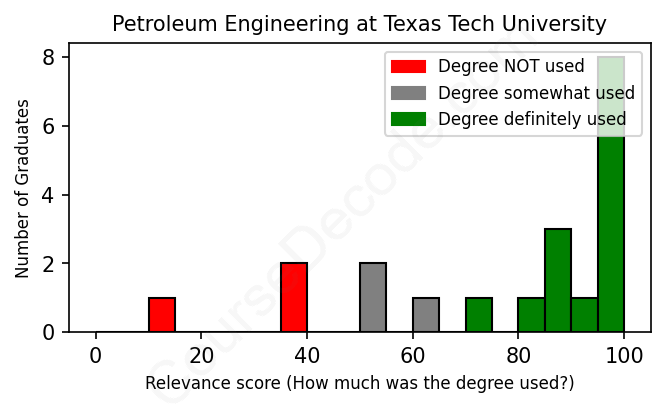
First, some facts. Of the Petroleum Engineering graduates from Texas Tech University we've analyzed , here's how many have used (or NOT used) their degree in their career:

These are estimates based on AI analysis of 20 LinkedIn profiles (see below).
The verdict? Above average. Overall, with an average relevance score of 77%, Petroleum Engineering graduates from Texas Tech University have a higher likelihood (+10%) of finding work in this field compared to the average graduate across all fields:
And for comparison, here's the chart for all profiles we've looked at across all degrees.
Also, after graduating, 40% of these graduates have pursued further education other than another Bachelor's degree (such as a Masters degree or other), compared to the average across all profiles of 35%. This suggests you may need more than just a Bachelors degree to be competitive as a Petroleum Engineering graduate.
See the details:
|
Relevance score: 36% We think this person has NOT gone into a career related to their degree. We think this person has NOT gone into a career related to their degree.
DEGREE INFOGraduated in 2019 from Texas Tech University with a Bachelor of Science - BS in Petroleum Engineering. Also pursued further education since (see below). JOB HISTORY SINCE GRADUATIONField Project Manager HistoryMaker Homes Jan 2021 - May 2021 Assistant Superintendent  KWA Construction May 2021 - Aug 2021 Assistant Project Manager  Diversified Construction of Oklahoma Aug 2021 - Mar 2022 Assistant Project Manager  Skybridge Construction Mar 2022 - Aug 2023 Commercial Estimator  Apex Fence & Construction LLC Sep 2023 - Present FURTHER DEGREES DONE SINCE GRADUATINGMaster's degreeThe University of Texas at Arlington 2020 - 2021 ABOUTNo information provided. |
The top 10 most common jobs done by the graduates we've analyzed (ranked most common to least) are:
From the profiles of those who graduated with a degree in Petroleum Engineering from Texas Tech University, it's clear that many of them have landed jobs that are strongly tied to their field. Most grads have taken on roles like Production Operations Engineer, Reservoir Engineer, and Project Engineer, which are highly relevant and necessitate a deep understanding of petroleum engineering principles. These roles typically involve hands-on work in the oil and gas industry, such as optimizing production, managing field operations, and working on reservoir simulations. For instance, several graduates have served as Petroleum Engineers at different companies, directly applying skills they learned in school on a day-to-day basis. Whether it's in hydraulic fracturing or production enhancement, these positions align closely with the technical training they received during their studies.
However, it's worth noting that not all positions held by these graduates are strictly related to petroleum engineering. Some have drifted into roles like Scenario Planner or Strategy Advisor, where business strategy and planning might take precedence over technical expertise. In some cases, graduates have moved into finance and managerial positions that, while benefitting from their engineering background, don’t necessarily leverage the petroleum-specific skills they acquired. Overall, a significant portion of the jobs people have taken after graduating remain closely tied to petroleum engineering, reflecting a strong relevance in many cases. But, there are indeed a few exceptions where the link to their degree appears weaker, particularly in more business-oriented or technology-focused roles. So, while the degree opens up a lot of relevant doors, some grads are finding paths that divert from their original training.
Here is a visual representation of the most common words in job titles for Petroleum Engineering graduates (this is across all Petroleum Engineering graduates we've analyzed, not just those who went to Texas Tech University):

Graduates from the Petroleum Engineering program at Texas Tech University seem to have embarked on some solid career paths after graduation. Most of them began their careers in relevant positions related to petroleum engineering, often starting as engineers or in technical roles with major companies in the energy sector, like Chevron, Halliburton, and others. For instance, many early roles included positions like Production Operations Engineer or Reservoir Engineer. These initial jobs often serve as a strong foundation for building expertise in the field and moving up the ranks. It's clear that many of these graduates secured positions that align well with their degree right away, allowing them to gain valuable industry experience early in their careers.
Fast forward five to ten years, and you can see a trend of career advancement and specialization among these engineers. Many have transitioned into higher-level roles, such as project managers, strategy advisors, and senior technical professionals. Some have even moved into leadership roles or ventured into related fields like finance and management, as seen with some graduates pivoting to energy banking or technical account management. While there are a few who have taken less conventional paths, such as moving into construction or technology-related roles, the majority appear to have maintained a trajectory that keeps them connected to the petroleum industry. Overall, it looks like Texas Tech graduates are generally doing well and remain relevant in the field they studied, navigating their careers with a blend of technical skill and professional growth.
Getting a Bachelor’s degree in Petroleum Engineering, including at Texas Tech University, can be pretty challenging, but it really depends on your interests and strengths in subjects like math and science. The curriculum is definitely rigorous, with a lot of technical courses that require solid problem-solving skills and a good grasp of concepts like thermodynamics and fluid mechanics. Many students find it demanding but manageable if they're dedicated and enjoy the subject matter. So, while it’s not an easy ride, it’s certainly doable if you're passionate about it and are willing to put in the effort!
Most commonly, in the LinkedIn profiles we've looked at, it takes people 4 years to finish a Bachelor degree in Petroleum Engineering.
Looking at the job paths of these Petroleum Engineering grads from Texas Tech, it seems like many of them have landed pretty solid gigs in their field, which likely means they're making decent money. For instance, those who started out at big companies like Chevron or Halliburton often climb the ladder into roles with fancy titles like "Reservoir Simulation Engineer" or "Senior Technical Professional," which usually come with nice salaries. Plus, many of them have progressed to managerial or advisor roles, suggesting they’re raking in even more dough as they gain experience. Of course, individual salaries can vary, but overall, it looks like a lot of these folks are doing pretty well financially in the oil and gas industry!
Here is a visual representation of the most common words seen in the "about" section of LinkedIn profiles who have a Bachelor degree in Petroleum Engineering (this is across all Petroleum Engineering graduates we've analyzed, not just those who went to Texas Tech University). This may or may not be useful:

Here are all colleges offering a Bachelor degree in Petroleum Engineering (ordered by the average relevance score of their Petroleum Engineering graduates, best to worst) where we have analyzed at least 10 of their graduates:
| College | Score | Count |
|---|---|---|
 Texas A&M University Texas A&M University
|
80 | 25 |
 Louisiana State University Louisiana State University
|
79 | 26 |
 University of Oklahoma University of Oklahoma
|
78 | 20 |
 Texas Tech University Texas Tech University
|
77 | 20 |
 Penn State University Penn State University
|
75 | 11 |
 The University of Texas at Austin The University of Texas at Austin
|
75 | 18 |
 Marietta College Marietta College
|
70 | 20 |
 Colorado School of Mines Colorado School of Mines
|
69 | 30 |
 West Virginia University West Virginia University
|
68 | 10 |
 University of Houston University of Houston
|
67 | 19 |
 University of Louisiana at Lafayette University of Louisiana at Lafayette
|
63 | 10 |